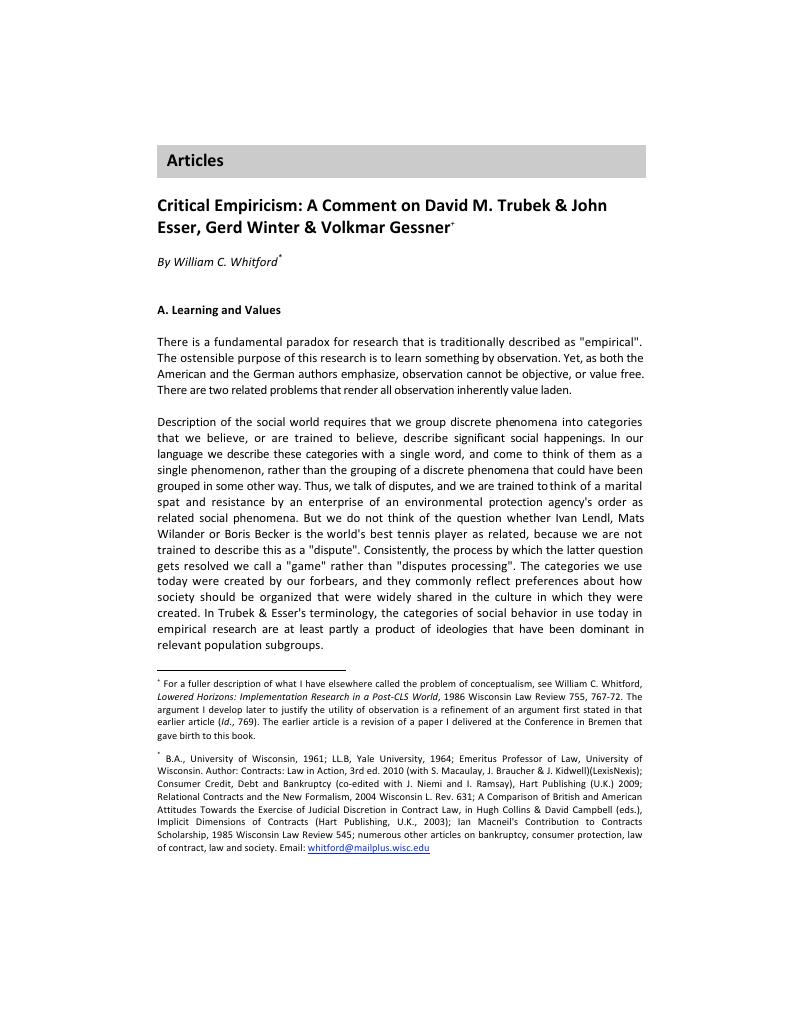No CrossRef data available.
Published online by Cambridge University Press: 06 March 2019

1 We can use this capacity to reject both capitalism and Marxism, and this is what much of the literature in the “critical” tradition seeks to do.Google Scholar
2 A graphic, and tragic, recent example of this common understanding is the official explanation given for the shooting down of an Iranian passenger airliner by an American warship in the Persian Gulf. That explanation attributed the tragedy to a misreading of images on a radar screen by American servicemen in battle for the first time and biased by the emotions of that circumstance to interpret the images as suggesting an attack on their ship that was in fact not occurring.Google Scholar
3 Though never with quite the specificity stated in the text, there are critiques of legal sociology by American critical legal scholars that come close to questioning the ability of empirical research to teach anything not learnable in other ways. See Mark G. Kelman, Trashing, 36 Stanf. L. Rev. 293 (1984); White, G. Edward, From Realism to Critical Studies: A Truncated Intellectual History, 40 Sw. L. J. 819 (1986).Google Scholar
4 Trubek, & Esser, , this issue, at note 31, very specifically deny any rejection of what they call “investigatory practices”, which I presume includes observation. Their definition of “empiricism”, text at note 33, seems to contemplate that what they call empirical research need not include observation, however.Google Scholar
5 Goetz, Charles J. & Scott, Robert E., Principles of Relational Contracts, 67 Va. L. Rev. 1089 (1981).Google Scholar
6 Sometimes learning is said to be transformative only if the learning results in discarding whole world views, or ideologies, in favor of others. But I have in mind as “transformative” even little insights as long they are not logically compelled from pre-existing knowledge. The second part of this comment discusses whether little insights can qualify as “critical empiricism”.Google Scholar
7 Archimedes’ principle is that an object submerged in water displaces its volume regardless of the object's weight. I was told in my high school physics class that Archimedes arrived at the insight while in the bathtub, whereupon he jumped out, unclothed, and ran into the street shouting “Eureka, I have it”.Google Scholar
8 Macaulay, Stewart, Non-Contractual Relations in Business: A Preliminary Study, 28 Am. Sociol. Rev. 55 (1963).Google Scholar
9 Whitford, supra note, 776-79.Google Scholar
10 See Sarat, Austin & Silbey, Susan S., The Pull of the Policy Audience, 10 Law & Policy 97 (1988).Google Scholar
11 See Kennedy, David, 58 S. Cal. L. Rev. 251 (1985).Google Scholar
12 This point is discussed extensively in Trubek & Esser, this issue, and is the basis on which they direct their strongest criticism at the work of the Amherst group. On the subjectivity of causation, see Mark G. Kelman, The Necessary Myth of Objective Causation Judgments in Liberal Political Theory, 63 Chi.-Kent L. Rev. 579 (1987).Google Scholar
13 I reject the view, associated with some strains of the Marxist left, that by legitimating the existing order, the welfare state reforms have delayed the revolution that represents the only true hope for progressive change. I agree that the welfare state reforms have tended to legitimate the existing order, but I am not so confident that revolution, rather than a successful repression and further subordination of disadvantaged groups, would have been the consequence of a failure to adopt them. Nor is revolution always a more desirable alternative than incremental reform. Witness (insert whatever revolutionary society particularly appalls you - e.g., Iran)Google Scholar
14 Joel Handler's research on the American welfare system and Herman Goldstein's work on the American police seem to me examples of politically correct implementation research. Both scholars are intensely empirical, engaging in extensive observation. They have concentrated on studying and promoting successful reform experiments, and I suspect their work has helped these experiments to survive and perhaps even to expand. E.g., Joel Handler, The Discretionary Decision (1986); Herman Goldstein. Reshaping The Police Function: The Problem-Oriented Approach (1989).Google Scholar